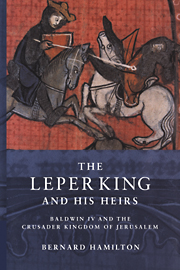Book contents
- Frontmatter
- Dedication
- Contents
- List of illustrations
- Acknowledgements
- List of abbreviations
- Maps
- Genealogies
- Glossary
- Prologue
- 1 The sources for Baldwin IV's reign
- 2 Baldwin's childhood
- 3 The kingdom
- 4 The international status of the kingdom
- 5 The king's minority
- 6 Western aid. William of Montferrat and Philip of Flanders
- 7 The victor of Mont Gisard
- 8 Prince Reynald's initiative
- 9 The dying king
- 10 The heirs of the leper king
- Epilogue
- Appendix An evaluation of the leprosy of King Baldwin IV of Jerusalem in the context of the medieval world
- Bibliography
- Index
4 - The international status of the kingdom
Published online by Cambridge University Press: 05 February 2015
- Frontmatter
- Dedication
- Contents
- List of illustrations
- Acknowledgements
- List of abbreviations
- Maps
- Genealogies
- Glossary
- Prologue
- 1 The sources for Baldwin IV's reign
- 2 Baldwin's childhood
- 3 The kingdom
- 4 The international status of the kingdom
- 5 The king's minority
- 6 Western aid. William of Montferrat and Philip of Flanders
- 7 The victor of Mont Gisard
- 8 Prince Reynald's initiative
- 9 The dying king
- 10 The heirs of the leper king
- Epilogue
- Appendix An evaluation of the leprosy of King Baldwin IV of Jerusalem in the context of the medieval world
- Bibliography
- Index
Summary
When Amalric became king in 1163 the Crusader States were menaced by the power of Nur ad-Din, ruler of Damascus and Aleppo, whose brother, Qutb ad-Din Mawdud, ruled northern Iraq from Mosul. Nur ad-Din and Amalric fought each other for control of the weak and faction-torn Fatimid caliphate of Cairo, and early in 1169 Nur ad-Din's general Shirkuh was victorious. When Shirkuh died two months later his nephew Saladin became effective ruler of Egypt although in theory he was only the vizir of the Fatimid caliph, and Amalric's attempt in the autumn of 1169 to dislodge him from power with the support of the Byzantine navy was a fiasco. The situation of the Crusader States then became extremely hazardous because they were surrounded by a single and hostile Islamic power.
Amalric and his advisers did not consider that trying to live at peace with Nur ad-Din was an option. His dedication to the jihad was not in doubt, for he had commissioned a pulpit which he intended to place in the al-Aqsa mosque when he recaptured Jerusalem. In any case, Frankish experience during the previous seventy years led Amalric to reject as unrealistic the possibility of peaceful coexistence. Strong Muslim powers had consistently been hostile to the Franks and during that time Edessa had been lost, Antioch shorn of half its territory, the eastern marches of Tripoli had been overrun and the defences of the Kingdom of Jerusalem seriously weakened. Unless they attempted to exploit Muslim weaknesses the Syrian Franks would be surrounded by a unified Muslim state whose ruler would then use his combined resources to wage the holy war against them. Yet if the Franks were to adopt an aggressive policy they needed allies.
Their natural allies were the Catholic powers of western Europe to whom they were linked by ties of kinship, faith and culture, and in 1169 Amalric sent an embassy led by the archbishop of Tyre to ask the chief rulers of the West for help, but it proved fruitless. This was a consequence of the complex political situation in western Europe. Since 1159 there had been a papal schism.
- Type
- Chapter
- Information
- The Leper King and his HeirsBaldwin IV and the Crusader Kingdom of Jerusalem, pp. 63 - 83Publisher: Cambridge University PressPrint publication year: 2000



